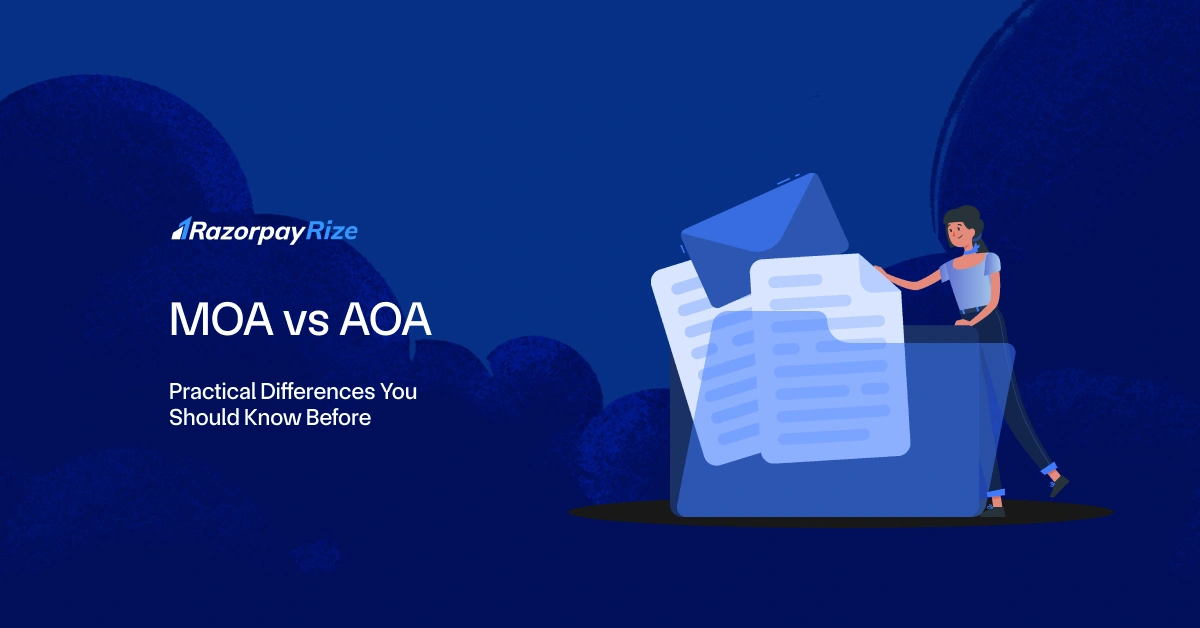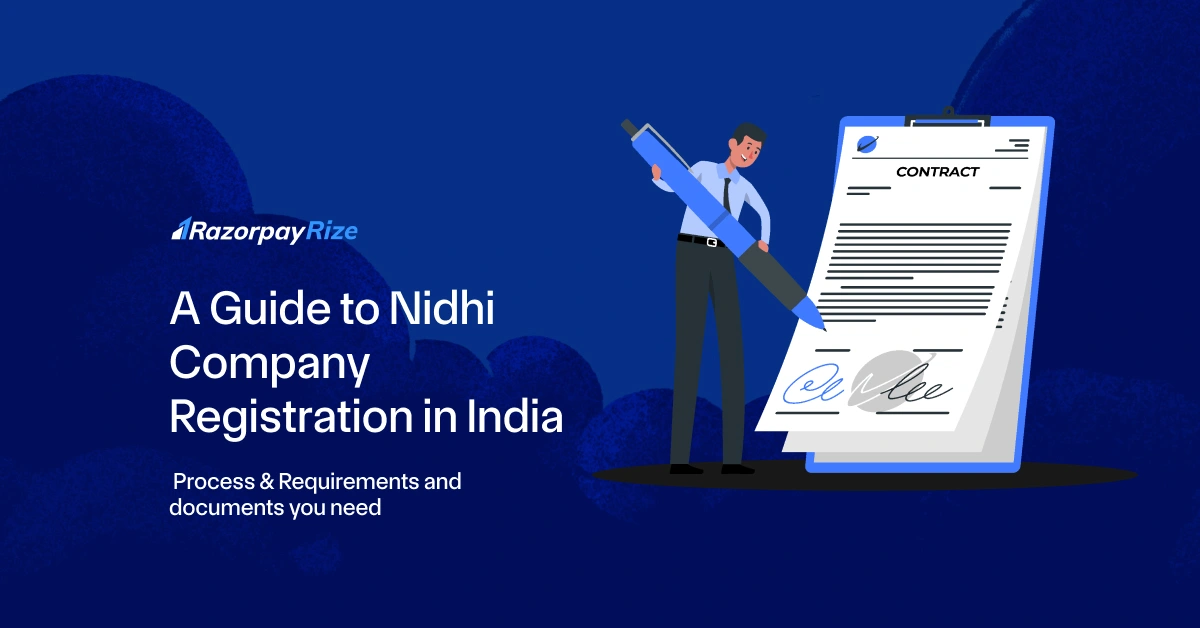When you’re starting a company in India, there’s plenty to get excited about — building your product, hiring your first team, and raising funding. But before any of that, you need to get the legal basics right.
Two documents form the backbone of your company’s legal identity: the Memorandum of Association (MOA) and the Articles of Association (AOA).
Together, they define both the company’s scope of operations and its internal governance structure. The MOA outlines the company's objectives and external boundaries. The AOA governs how the company will function internally, covering rules for management, decision-making, and shareholder rights.
In this blog, we’ll explain the distinct roles, key benefits, and structural differences between MOA and AOA so you can establish your company on the right legal footing and avoid common compliance pitfalls.
Table of Contents
Key Difference Between MOA and AOA
Here’s a simple comparison to clarify how the MOA and AOA differ:
What is a Memorandum of Association (MOA)?
The Memorandum of Association (MOA) acts as a company's legal charter. It defines your company's scope of operations and its relationship with the outside world. Think of it as the “birth certificate” of your business; without it, your company cannot legally exist.
Key points about the MOA:
- It outlines the company's name, registered office, objectives, share capital, and liability.
- It is a mandatory document required for incorporation under the Companies Act, 2013.
- It must be signed by all initial shareholders (also known as subscribers) and filed with the Registrar of Companies (ROC).
- The MOA becomes a public document, accessible via the Ministry of Corporate Affairs (MCA) portal.
In short, the MOA defines what your company is legally allowed to do.
Here is a complete guide on MOA with templates.
Benefits of MOA
A well-drafted MOA benefits a company in several ways:
- Establishes Legal Identity: It acts as the legal document that brings the company into existence.
- Defines Scope of Business: It sets clear boundaries for what the company can and cannot do.
- Protects Shareholder Rights: Investors can see the company’s stated objectives before deciding to invest.
- Builds Credibility: A publicly available MOA adds transparency and helps build trust with stakeholders.
- Ensures Regulatory Compliance: It ensures the company remains within the ambit of applicable laws and regulations.
Main Clauses of MOA
The MOA typically contains the following six main clauses:
- Name Clause: States the legal name of the company.
- Registered Office Clause: Specifies the location of the company's registered office.
- Object Clause: Defines the company’s business objectives (main and ancillary).
- Liability Clause: Clarifies whether shareholder liability is limited or unlimited.
- Capital Clause: Details the company’s share capital structure.
- Subscriber Clause: Lists the names of the initial shareholders and their shareholdings.
What are Articles of Association (AOA)?
The Articles of Association (AOA) outline the internal rules and governance structure of the company. While the MOA defines your company’s external identity, the AOA governs its internal workings.
Key points about the AOA:
- It specifies how the company will be managed and run day-to-day.
- It outlines the rights and responsibilities of shareholders and directors.
- It is customised for each company and signed by the initial shareholders.
- It is submitted along with the MOA to the ROC during incorporation.
- The AOA is legally binding on both the company and its members.
In simple terms, the AOA serves as the “rulebook” for how your company will operate.
Read More: Articles of Association Template - INC 34 Form Download
Benefits of AOA
A good AOA brings several operational advantages:
- Establishes Governance Rules: It provides a clear framework for managing internal operations.
- Defines Director Roles: It outlines powers, duties, appointment, and removal of directors.
- Facilitates Decision-Making: It guides how decisions are made at the Board and shareholder levels.
- Prevents Internal Conflicts: It sets clear expectations around rights and responsibilities, helping to resolve disputes.
- Supports Operational Efficiency: By providing detailed procedures for meetings, share transfers, and other processes.
Contents of an AOA
A typical AOA contains the following key components:
- Meeting Procedures: Guidelines for conducting Board and shareholder meetings.
- Share-Related Rules: Terms for share issuance, transfer, conversion, and forfeiture.
- Director Responsibilities: Appointment, removal, powers, duties, and compensation of directors.
- Audit and Accounts: Procedures for maintaining accounts and conducting audits.
- Conflict Resolution: Rules for resolving disputes among members or between members and the company.
- Winding Up: Processes to be followed if the company is dissolved.
{{company-reg-cta}}
Conclusion
Both the Memorandum of Association (MOA) and Articles of Association (AOA) are essential legal documents for every company in India. While the MOA defines the company's legal identity and permitted scope, the AOA lays down the internal rules for managing the company.
So take the time to draft them carefully (with professional advice!) and align them with your vision for the company. A strong MOA and AOA will give you the legal clarity and operational confidence to scale your business smoothly.
Frequently Asked Questions
Private Limited Company
(Pvt. Ltd.)
- Service-based businesses
- Businesses looking to issue shares
- Businesses seeking investment through equity-based funding
Limited Liability Partnership
(LLP)
- Professional services
- Firms seeking any capital contribution from Partners
- Firms sharing resources with limited liability
One Person Company
(OPC)
- Freelancers, Small-scale businesses
- Businesses looking for minimal compliance
- Businesses looking for single-ownership
Private Limited Company
(Pvt. Ltd.)
- Service-based businesses
- Businesses looking to issue shares
- Businesses seeking investment through equity-based funding
One Person Company
(OPC)
- Freelancers, Small-scale businesses
- Businesses looking for minimal compliance
- Businesses looking for single-ownership
Private Limited Company
(Pvt. Ltd.)
- Service-based businesses
- Businesses looking to issue shares
- Businesses seeking investment through equity-based funding
Limited Liability Partnership
(LLP)
- Professional services
- Firms seeking any capital contribution from Partners
- Firms sharing resources with limited liability
Frequently Asked Questions
What are the key differences between MOA and AOA?
The Memorandum of Association (MOA) defines a company's external scope — its identity, objectives, and powers.
The Articles of Association (AOA) govern the company’s internal operations — the rules for directors, shareholders, meetings, and day-to-day management.
Which is more powerful, MOA or AOA?
The MOA has more legal authority because it defines the very purpose and scope of the company. A company cannot act beyond its MOA — such acts would be considered ultra vires (beyond its powers) and are invalid.
The AOA operates within the framework of the MOA and cannot override it. So while both are essential, the MOA holds more legal weight in defining what the company is permitted to do.
How to alter/update MOA and AOA?
Both the MOA and AOA can be altered, but the process requires shareholder approval and compliance with the Companies Act, 2013.
To alter MOA:
- Pass a special resolution at a shareholders' meeting.
- File Form MGT-14 with the Registrar of Companies (ROC).
- In some cases (e.g., change in name, registered office state), approval from the Central Government or ROC is also required.
To alter AOA:
- Pass a special resolution at a shareholders' meeting.
- File Form MGT-14 with the ROC.
- The altered AOA must comply with the Companies Act and cannot conflict with the MOA.
How to find the MOA of a company?
You can access the MOA of any registered company in India via the Ministry of Corporate Affairs (MCA) portal:
- Visit www.mca.gov.in
- Use the "View Public Documents" service.
- Search for the company using its CIN (Corporate Identification Number) or name.
- Download the MOA (and AOA) if available- a small government fee may apply.
How to get the MOA of a Private Limited Company?
The process is the same as above, even for Private Limited Companies:
- Go to the MCA portal and use the "View Public Documents" feature.
- Enter the company's details (name or CIN).
- View/download the available filings, including the MOA and AOA.
Alternatively, if you are a director or shareholder of the private company, you can also request a copy of the MOA directly from the company’s registered office as per your rights under the Companies Act.

















